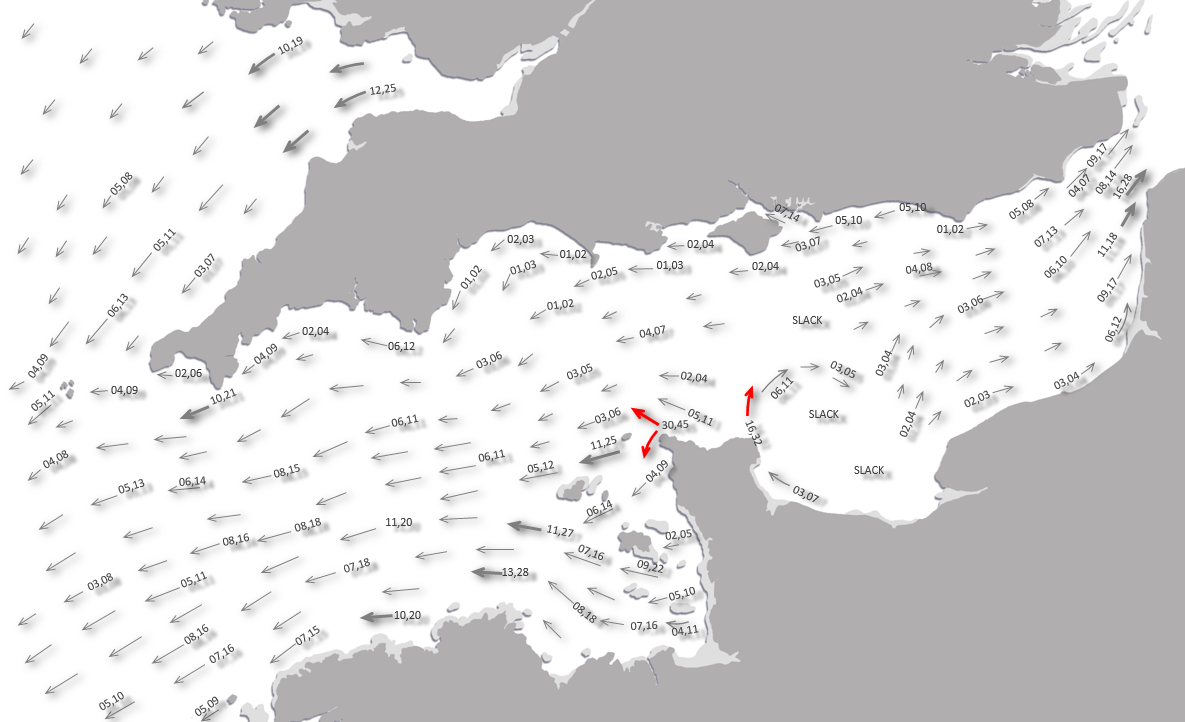- +Today's Tides for Old Town Bay
- • Local HW-4 to HW-2: The local first flood flows from the south through southwest. Water funnels into St Mary’s Sound and leaves via all other exits. At the end of this period, tidal flow is starting to enter between Tresco and St Martin’s.
- • Local HW-2 to HW+2: The local late flood flow is from southwest, west, northwest, and then west. Water enters St Mary’s Sound and between Bryher and Tresco and Tresco and St Martin’s, exits between St Mary’s and St Agnes and St Mary’s and St Martin’s. After HW there is little flow into St Mary’s Sound, and flow reverses in the Bar Point area carrying water southwards.
- • HW+2 to HW+4 The local early ebb flows from north to northeast. Water enters between Bryher and Tresco, Tresco and St Martin’s and exits by all other routes.
- • HW+4 to HW-4 The local late ebb is from the northeast, east, and then southeast. Water enters between St Mary’s and St Martin’s, and exits by all other routes.
- +Old Town Bay's Future Tides
- +Weather for Old Town Bay
- +Advanced Haven Search
- +Contacts and Emergency for Old Town Bay
- +Local Navigation Resources

| Low Water | High Water |
|---|---|
| 01:00 (2.2m) | 01:00 (4.6m) |
| 13:25 (1.9m) | 13:25 (4.6m) |
| Now Falling |  |
| Time to low | 19:27 |
| Total fall | 2.7m |
| Remaining fall | |
| Tide height over CD |
| Mean Spring Curve | Mean Neap Curve | Intervening Period |

Small tidal stream inaccuracies can develop when advancing beyond HW Dover +6. Because of this we only enable today's tidal stream chartlets to advance 24 hours. Future tidal planning is best accomplished by using Old Town Bay's future tides predictor below.
The above image represents the current tidal streams offshore of this haven. Streams attaining three knots and above are highlighted by red arrows
 . All times are in local time with red text indicating springs, blue indicating neaps and gray between tidal events. Click [+] to advance the estimate by an hour and click [-] to step back.
Future tidal planning is best accomplished by using Old Town Bay's future tides predictor below.
. All times are in local time with red text indicating springs, blue indicating neaps and gray between tidal events. Click [+] to advance the estimate by an hour and click [-] to step back.
Future tidal planning is best accomplished by using Old Town Bay's future tides predictor below.
Do you need more information on the tidal graphics?
Arrows represent the direction of tidal streams with lighter or shorter arrows indicating weaker streams. Stronger streams are indicated by heavier or longer arrows, and as mentioned above, red arrows flagging rates of 3 knots and above. Numerals represent [mean neap, mean spring] rates in tenths of a knot. For example the numbers 12,23 would indicate a mean neap of 1.2 knots and a mean spring of 2.3 knots.
More local tidal details
Today's ST. MARY'S tides — High waters: 11:13, 01:00, Low waters: 05:05, 17:53Today's Dover tides — High waters: 05:05, 17:57, Low waters: 12:11, 01:00
We are now on Neaps.
MHWS 5.7m MHWN 4.3m MLWN 2.0m MLWS 0.7m
Highest Astronomical Tide (HAT) 6.4m, Mean Sea Level (MSL) 2.91m
HW St Mary’s is HW Dover – 0630, Devonport -00.55, Duration 0600
Tides are considerably affected by wind conditions and barometric pressure.
The tide in the open sea is a progressive wave, with slack water 4 hours before and 2 hours after High Water (HW). Tidal currents rarely exceed 1 knot within the island group, but flows of 2 knots or greater occur around the outer edges of the archipelago, with strong tidal races off major headlands. At certain places around the islands wind against the tide conditions can become quite rough. This is worth considering when making passage plans.
The northeast-going stream, along the southern coast of St. Mary's, turns northward into Crow Sound after -0145 Devonport (+0500 Dover), and forms a race which extends across the entrance to the sound, and as much as 2 miles eastward from Tolls Island, and it may be dangerous during gales.
At Watermill cove the northwest-going stream, spring rate 0.9 knots, begins + 0430 Devonport (-0110 Dover) and runs for 3 hours only. The east-southeast going stream, spring rate 0.9 knots, begins -0455 Devonport (+0150 Dover) and runs till -0100 Devonport (+0545 Dover). The stream is then slack for a short period after which it again runs east by southeastward, spring rate 0.7 knots till +0430 Devonport (-0110 Dover).
Tidal currents flow in a rotary fashion through the islands with the following behaviours according to the local tidal cycle:

This tool can be used to estimate future costal tidal streams for this area. All that is required are two simple steps:
Step 1: What is the Dover High Water for the target date?
Use a current Dover Tide Table to find Dover High Water for the target date. The National Oceanography Centre offers online tidal predictions for up to 28 days from today. Click here to open their tide table for Dover

Step 2: Input the target date's Dover High Water
Taking a mean tidal offset from Dover's tide, we expect your targetted date's associated local tide at to be:
High waters: Low waters:
Data based on an average tide is only accurate to within one hour, if you more precise times are required use the ISA tidal predictions, with ST. MARY'S offset -01:00.
| Today's overview |
||||
 |
 |
 |
 |
 |
| °C °C |
°C °C |
°C °C |
°C °C |
°C °C |
Headline: Cloudy with patchy rain, but some brighter breaks as well.
Today: A mainly cloudy day with hill fog lingering across the Moors and scattered light rain in places, but some brighter breaks developing further east as well. Milder than Saturday, especially in any sunshine, with light winds for many. Maximum Temperature 15C.
Tonight: Rather cloudy with hill fog lingering across the Moors and the odd spot of rain in places overnight. Mild beneath the cloud, but feeling chilly in any clearer spells. Minimum Temperature 9C.
Monday: Early cloud and light rain soon clear south leaving a dry day with plenty of hazy sunshine. Light winds, and feeling warm in sheltered, sunny spots. Maximum Temperature 14C.
Outlook for Tuesday to Thursday: Remaining settled this week with high pressure bringing largely dry and fine conditions. Turning cloudier each day, but feeling rather chilly, and breezy at times along the south coast.

Click [+] to advance by twelve hours and click [-] to step back. The forecasted time is presented in the top left hand corner of the pressure chart. Click the image to display it in a full window.
 Get today's Met Office Video Forecast
Get today's Met Office Video Forecast |  |  |
 |  |  |
| Set your current location | Set the maximum distance you are prepared to travel | Check off what you want |
All services are coordinated by the Maritime Rescue Co-ordination Centre (MRCC) at Falmouth. They
maintain a continuous watch on DSC MF(2187.5kHz), DSC Channel 70 as well as Channel 16 off Land's End. Their working channels are 06, 10, 23, 67 and 73. The area of Scilly is covered by channels 16 and 23 from a remote station at St Mary's.
St Mary’s Harbour Master
The Harbour Office,
The Quay, St Mary’s,
Isles of Scilly,
TR21 0HU
Office hours: April-October: 0800-1700 Daily, November-March: 0800-1700 Weekdays
 +44 1720 422768, out of hours
+44 1720 422768, out of hours  +44 7789 273626,
+44 7789 273626,  hm@stmarys-harbour.co.uk,
hm@stmarys-harbour.co.uk,  www.stmarys-harbour.co.uk/, listening on
www.stmarys-harbour.co.uk/, listening on  14/16 [St Mary’s Harbour], working 14.
14/16 [St Mary’s Harbour], working 14.Tresco Harbourmaster (for New & Old Grimsby),
 +44 1720 423653,
+44 1720 423653,  +44 7778 601237,
+44 7778 601237,  harbourmaster@tresco.co.uk,
harbourmaster@tresco.co.uk,  www.tresco.co.uk/arriving/moorings.
www.tresco.co.uk/arriving/moorings. Admiralty Chart 2655 'English Channel Western Entrance' 1148 'Isles of Scilly to Lands End' 34 'Isles of Scilly', 34 'Isles Of Scilly', 883 'Isles of Scilly and the Principal Off-Islands' Leisure Chart Folio - SC5603 'Falmouth to Hartland Point including the Isles of Scilly' (8 to 13) provides various parts of the Isles of Scilly including small scale Falmouth to Scillies.
Imray C10 - 'Western English Channel', C7 - 'Falmouth to Isles of Scilly and Trevose Head', Y49 'Isles of Scilly' (Small Format).
Please note eOceanic makes no guarantee of the validity of this information. Whilst every effort has been made to use valid source data and ensure calculations are correct, no warranty is made. All tidal predictions are approximations and differences used to calculate times and heights at secondary ports are based on stated averages that reduce precision. This information is provided as a guide only and is not to be used for navigation. For navigation please refer to published tidal tables. Actual height and time of tides are affected by barometric pressure and other weather effects. Any data provided on this page is entirely used at your own risk and you must read our legal page if you view data on this site.


